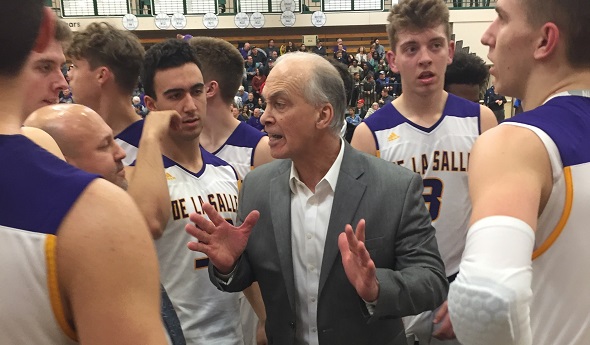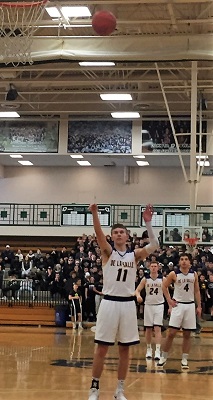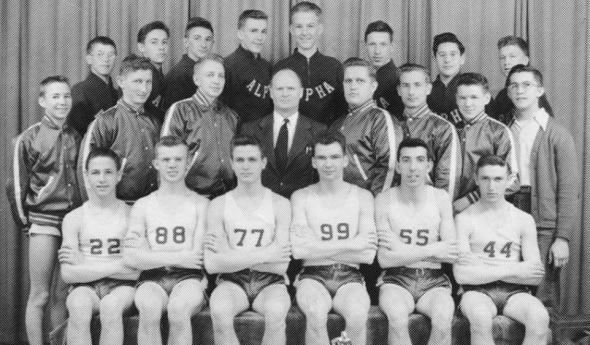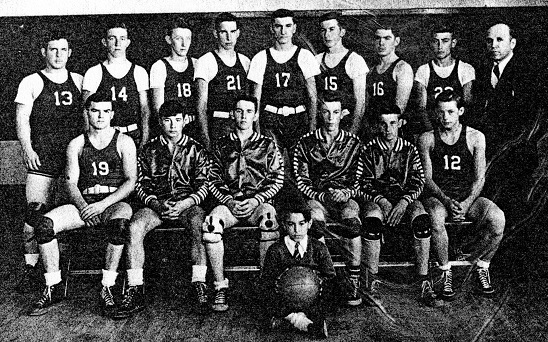
Esler Pilots DeLaSalle Back to Final Week
By
Tom Markowski
Special for Second Half
March 19, 2018
WARREN – There isn’t much that Greg Esler hasn’t seen or experienced as a coach and as a father.
 Through it all he’s learned to take nothing for granted, in life and as a coach.
Through it all he’s learned to take nothing for granted, in life and as a coach.
Esler, 63, coached St. Clair Shores Lake Shore to its first and only MHSAA boys basketball title in 1994, in Class B. That team was led by Travis Conlan, who finished second in the voting for Mr. Basketball that season. Conlan would go on to play at University of Michigan, one of a number of Esler-coached players who went on to the college – and for some – professional ranks.
Esler is in his 31st season as a head coach, with the last 24 at Warren DeLaSalle. Twenty-one times the Pilots have won a District title with Esler on the bench. In 2007, DeLaSalle reached a Class A Semifinal for just the second time in school history, as it lost to Manny Harris and Detroit Redford 56-50. (Note: In addition to two Class A Semifinal appearances, DeLaSalle also reached a Class B Final in 1982).
Consistency has been a hallmark of Esler’s programs, and even after all these years a fire burns in his stomach. He’s retained a burning desire to compete and to win. As the years have piled up, Esler has become more appreciative of the success his program has achieved and the experiences gained.
So when DeLaSalle defeated Macomb Dakota, 56-51, in a Regional Final last Wednesday, there was reason to celebrate. As good as DeLaSalle has been recently, it hadn’t won a Regional title since 2010. The Pilots have been to the Detroit Catholic League final each of the last three seasons and have won five District titles since 2010 including the last three. But the end of last season stung more than most. DeLaSalle reached a Regional Final and then lost to Troy, 48-40, in an ugly game where the Pilots shot less than 30 percent from the field.
Most of that team is back as the Pilots head into the final week of this season. Esler has nine seniors including two of the top players in the league in point guard Justin Fischer and guard-forward Luke Pfromm, the starting quarterback on the Division 2 championship football team.
Esler started coaching at Warren St. Anne grade school in 1983, then went to DeLaSalle for three seasons beginning in 1985 under then-coach Gary Buslepp. Esler got his shot as a head coach in 1987 at Lake Shore and quickly made that program relevant. Lake Shore reached the Class B Semifinals in 1993 before losing to coach Norwaine Reed and Saginaw Buena Vista.
Esler took over the DeLaSalle program at the start of the 1994-95 season. His career record stands at 530-216 heading into tonight’s Class A Quarterfinal against Detroit U-D Jesuit.
“We instilled a system here,” he said. “The first thing is to have your players in condition. Second is defense. I’ve always stressed defense. And third, and maybe this should be first, is talent. We’ve always had really good players here. And the players we’ve had want to get better.”
What often goes unnoticed in a basketball program is the work of the assistant coaches. Esler has been blessed with loyal and knowledgeable assistants. His top assistant is Tom Mehl, who played for Esler for two seasons at Lake Shore. Mehl was on staff for Esler’s last four seasons at Lake Shore and has been with Esler every step of the way at DeLaSalle.
Jeff Becker is in his 13th season as an assistant, and another, Dave Grauzer, recently left the program and now is an assistant at Traverse City West.
 “Surrounding yourself with good people is at the top of the list,” Esler said. “One thing about Tom, there’s no one I’ve seen who can go to a game to scout and pick up something no one else would see. Like a player who takes two dribbles before driving to his right or left. For Becker, it’s organization. He works well with the kids, and he’s got the post players. Mehl has the guards.
“Surrounding yourself with good people is at the top of the list,” Esler said. “One thing about Tom, there’s no one I’ve seen who can go to a game to scout and pick up something no one else would see. Like a player who takes two dribbles before driving to his right or left. For Becker, it’s organization. He works well with the kids, and he’s got the post players. Mehl has the guards.
“Over the years I’ve listened. Listened to other coaches. I don’t have all the answers. I talk to Steve Hall at (Detroit) Cass Tech all the time. He’s been a great friend over the years.”
This team has a closeness not always seen. The fact that there are nine seniors is one reason. Esler points out that he’s been with this group for more than 100 days this season, and when you’re around a group that long tempers can flare – so it’s important to keep the present in perspective and realize they all want to reach the same goal.
“We do a lot of things outside of basketball,” Esler said. “Last week four of my captains read to the students at (St. Clair Shores) St. Germaine grade school. My wife, Renee, is a fourth and fifth grade teacher there, and it’s way for the players to interact with the younger students.
“I read an article recently on (Michigan) coach (John) Beilein and how the game has changed. The kids have changed. We watch game film but not like we used to. Their attention span isn’t like it used to be. The technology now, with Facebook and texting, it’s unbelievable. We might watch film for 20 minutes where we used to watch for hours.
“My players will tell you, I love the practices much more than they do. Games are like taking a test. If you didn’t win, maybe you failed at some area that cost you. They love each other and they do a good job of listening. All five starters have scored 20 points or more in a game this season. And they don’t get rattled. We were down four to Dakota with four minutes to go and Pfromm came to me in the huddle and said, ‘Don’t worry coach. We got this.’ I can see why they won a state title in football.”
Fischer has matured significantly as a leader and force offensively. A three-year starter, he has signed with Lake Superior State.
Fischer came into the program as a skinny 5-foot-10 freshman. By the time he was a junior, he had grown five inches. Now he’s 6-4 and weighs 185 pounds.
“I was a pass-first guard as a sophomore,” he said. “I’ve worked on my shooting, just working on my total game.
“We were pumped up for that Dakota game. We got the crowd going crazy. We were down and Luke hit a couple of 3s. I had a dunk and hit four free throws late.”
DeLaSalle (18-7) will play Catholic League Central rival Detroit U-D Jesuit (22-3) next. The Class A Quarterfinal will be played Tuesday at 5 p.m. at Calihan Hall, the site of the Catholic League final. Jesuit won that game, 71-64. In fact, Fischer has lost nine consecutive games to U-D as a varsity player.
He shouldn’t feel alone. DeLaSalle hasn’t defeated U-D since 2014 when the teams tied for the Catholic League Central regular-season title – a streak of 14 straight defeats to the Cubs. U-D won this season’s meetings 64-45, 59-57 and 64-55.
Esler keeps U-D recent domination of his program on the light side.
“I’ve said I’d have to coach until 2031 to get to .500 against them,” he said.
 Tom Markowski is a columnist and directs website coverage for the State Champs! Sports Network. He previously covered primarily high school sports for the The Detroit News from 1984-2014, focusing on the Detroit area and contributing to statewide coverage of football and basketball. Contact him at [email protected] with story ideas for Oakland, Macomb and Wayne counties.
Tom Markowski is a columnist and directs website coverage for the State Champs! Sports Network. He previously covered primarily high school sports for the The Detroit News from 1984-2014, focusing on the Detroit area and contributing to statewide coverage of football and basketball. Contact him at [email protected] with story ideas for Oakland, Macomb and Wayne counties.
PHOTOS: (Top) Warren DeLaSalle coach Greg Esler talks things over during his team’s Regional Final win against Macomb Dakota. (Middle) Justin Fischer launches a free throw during the 56-51 victory.

Before the Bridge: Class E & the UP
July 31, 2017
By Ron Pesch
MHSAA historian
This is the final part in a series on MHSAA tournament classification, past and present, that has been published over the last two weeks and originally ran in this spring's edition of MHSAA benchmarks.
The stories are worthy of the silver screen.
Long lost legends of lore, forgotten by most in the Lower Peninsula of the state of Michigan.
Absurd anecdotes of basketball played behind glass, and out-of-bounds lines painted on walls.
Tales of overlooked places like Trenary and Champion and Doelle and Watersmeet.
This is the story of MHSAA Class E basketball.
From 1932 to 1947, Michigan's Upper Peninsula did not compete in the state-sponsored basketball tournament. Instead, the U.P. held a separate basketball tournament, crowning champions in Classes B, C and D. In 1941, the state added a fifth classification – Class E, comprised of schools with a student body numbering 75 or fewer. A fourth bracket was added to the U.P. tourney.
Following the 1948 season, the Upper Peninsula returned to the state tournament. Winners of the traditional U.P. tourney were pronounced regional champions, and advanced to the state quarterfinals in Classes B, C and D. However, since there were no Class E schools with basketball teams in the Lower Peninsula, the winner of the U.P. tournament crown was proclaimed Class E state champion. This arrangement continued through the spring of the 1960 season.
Since they were the state's smallest high schools, the gymnasiums came in all shapes and sizes. Some sported a center circle that intersected with the top of the key. Basketball courts that doubled as a stage required netting to keep the kids and the ball on the court and away from the audience seated below.
Fred Boddy, a former coach at Champion, recalled his first visit to Doelle. Located in copper country near Houghton, the hosts were the proud owners of “the smallest” gym in U.P.
“I couldn't believe my eyes. ... Here on the second floor were windows and bleachers all around filled with fans. The gym, of course, was located on the first floor, but to get into the gym one had to go around to the back of the school to enter through the boiler room to the locker rooms, which opened onto the gym floor much like a dugout on a baseball field. The players sat on a bench under the wall and could look out and see the game in this manner. The free throw lines intersected and there were no out of bounds lines... the wall itself was ‘out of bounds.’ On the floor during the game were 10 players and two referees. There were no sounds as all the fans were up on the second floor, glassed in.
The cheerleaders tried valiantly to fire up the fans up on the second floor, but the teams couldn't hear in the quiet below. The score clock and statistician personnel were placed in a corner box high over the floor in one corner of the gym. They attained this lofty perch by a ladder that was removed from the trap door after all three were in position and the game could thus commence. The timer then tied a rope around his ankle. To send a sub into the game the coach would send the player along the wall heading for this rope. He would pull the rope causing the timer to look down through the trap door and at next opportunity would ring the buzzer and admit this substitute”
Regardless of the challenges presented by these cracker-box gyms, the fans loved their basketball. “The enthusiasm was just the same, if not bigger, than schools twice and 10 times their size,” noted longtime U.P. historian, Jay Soderberg.
Coach Joseph Miheve's 1941 Palmer squad captured the state's first Class E title with a 39-28 win over Hulbert at Ironwood. A graduate of Wakefield High School, Miheve had never played high school basketball, serving as the team's manager.
The 1942 tournament, scheduled for March 19-21, was postponed one week because the city of Marquette was more or less taken over “by nearly 1,000 selective service registrants from every county in the Upper Peninsula” who had another and more serious battle in mind – World War II.
Palmer, this time coached by Elvin Niemi, repeated in Class E with a 37-31 victory over Bergland. It was Palmer's 32nd consecutive victory.
No tournament was held in 1943 due to the involvement of the United States in the war. In the 1944 championship game, Cedarville jumped out to a 19-14 first quarter lead but was held to 24 points in the remaining periods and fell to Amasa, 51-43 at Ishpeming.
Trenary made its lone Class E finals appearance in 1945, losing to Bergland 49-39 at Ishpeming, while the Alpha Mastodons won their first U.P. title since 1934 with a 48-28 win over Champion in 1946. It was the second of five Class E titles for Alpha coach Gerhardt “Gary” Gollakner, one of the finest coaches to come out of the U.P. Gollakner had coached at Amasa two years earlier, and his Mastodons would earn three additional titles during the 19-year run of the Class E championships.
Bergland became the tourney's second two-time winner in 1947, with a 40-37 win over the Perkins Yellowjackets. Perkins made four trips to the Class E finals over the years, including an appearance in the final year of the tournament, but came away empty-handed each time.
The Nahma Arrows made their first appearance in the championship in 1951, losing to Michigamme. Led by coach Harold “Babe” Anderson, a cage star at Northern Michigan College during the early 1940s, the Arrows returned to the finals in 1952. Nahma finished the year with a 21-0 mark and a 64-44 win over Marenisco for the crown.
 The two teams met again in a finals rematch the following year. The scored was tied six times, while the lead changed hands seven times in this barnburner. With 15 seconds to play, Nahma led 64-60. Marenisco's Robert Prosser hit a jump shot, then teammate Bill Blodgett stole a pass and scored to knot the game at 64. With two seconds remaining, Nahma's Bernard Newhouse was fouled. Newhouse hit the first free throw, but missed on the second. Teammate Wendell Roddy tipped in the rebound, and the Arrows had their second title.
The two teams met again in a finals rematch the following year. The scored was tied six times, while the lead changed hands seven times in this barnburner. With 15 seconds to play, Nahma led 64-60. Marenisco's Robert Prosser hit a jump shot, then teammate Bill Blodgett stole a pass and scored to knot the game at 64. With two seconds remaining, Nahma's Bernard Newhouse was fouled. Newhouse hit the first free throw, but missed on the second. Teammate Wendell Roddy tipped in the rebound, and the Arrows had their second title.
Alpha returned to the championship circle in 1954 with a 52-48 win over Perkins.
The 1955 title game matched a pair of the finest teams in Class E history. Trout Creek, making its first championship appearance, downed Alpha 84-83 in another Class E thriller. Don Mackey led the winners with 39 points. Tony Hoholek paced Alpha with 31, while junior John Kocinski added 21-points for the Mastodons.
Kocinski, a four-year starter at Alpha, scored 1,782 points during his career, then an all-time U.P. record. He once scored 51 points against Amasa, and could have scored more according to teammate Walter “Slip” Ball. “He refused to shoot in the fourth quarter, and passed up one shot after another,” Ball said.
Without question, Trout Creek was one of the powerhouse squads during the final years of the tourney. The Anglers, coached by Bruce “Pinky” Warren, a former captain of Purdue's football team, made four trips to the finals during the last six years of the Class E tourney. The defending champions downed Alpha in the semifinals of the 1956 tournament, then knocked off Hermansville 86-68 in the finals to repeat. It was a year of celebration for fans of U.P. basketball, as four of the state's five champions – Stephenson (B), Crystal Falls (C), Chassell (D) and Trout Creek (E) – came from Michigan's northern peninsula.
Hermansville returned to the finals in the spring of 1957 and earned its second Class E title with a 77-51 win over Michigamme at Escanaba. Trout Creek downed Perkins 61-41 for their third crown in 1958.
The 1959 championship, hosted at Northern Michigan College's fieldhouse, was a showdown of the U.P.’s only undefeated squads, Trout Creek and Nahma. Trout Creek was riding a 24-game winning streak that dated back to the 1958 season. A scoring machine, Warren's Anglers averaged 81.7 points per contest. Nahma, 19-0 on the season, boasted the U.P.'s strongest defense. Still coached by “Babe” Anderson, the Arrows had allowed an average of 38.2 points per game. Led by senior Warren Groleau, Nahma had been last defeated by Trout Creek in the semifinals of the 1958 tourney.
Leading 25-15 at the intermission, Nahma matched Trout Creek point for point in the second half for a 55-45 victory.
Hermansville, behind Richard Polazzo's 29 points and Irwin Scholtz's 27, downed surprise finalist Perkins 72-50 in the 1960 finale, to end this chapter in MHSAA history.
Today, most of the former Class E high schools are long gone. Many have closed their doors and consolidated with other area schools. Amasa and Alpha merged with Crystal Falls to form Forest Park. Palmer is now part of the Negaunee school system. Bergland and Trout Creek joined forces with Class D Ewen to form Ewen-Trout Creek. Hermansville combined with Powers to form North Central, to name but a few. A few remain: Dollar Bay, Marenisco (now Wakefield-Marenisco) and Watersmeet, and their enrollments are much the same as in the glory days of the state's fifth classification.
Author’s note: Special thanks to Jay Soderberg and Roger Finlan, who assisted in gathering statistics and quotes used in this article. Thanks also to Dick Kishpaugh, Bob Whitens, Walter “Slip” Ball, Dennis Grall, Fred Boddy, Bruce Warren, Gene Maki, Harold “Babe” Anderson and the various personnel at U.P. high schools for their contributions to this story.
PHOTOS: (Top) The Alpha boys basketball team won the 1950 Class E title by nearly doubling up Michigamme, 52-28. (Middle) Hermansville claimed the 1948 title with a 58-38 win over Rockland.

